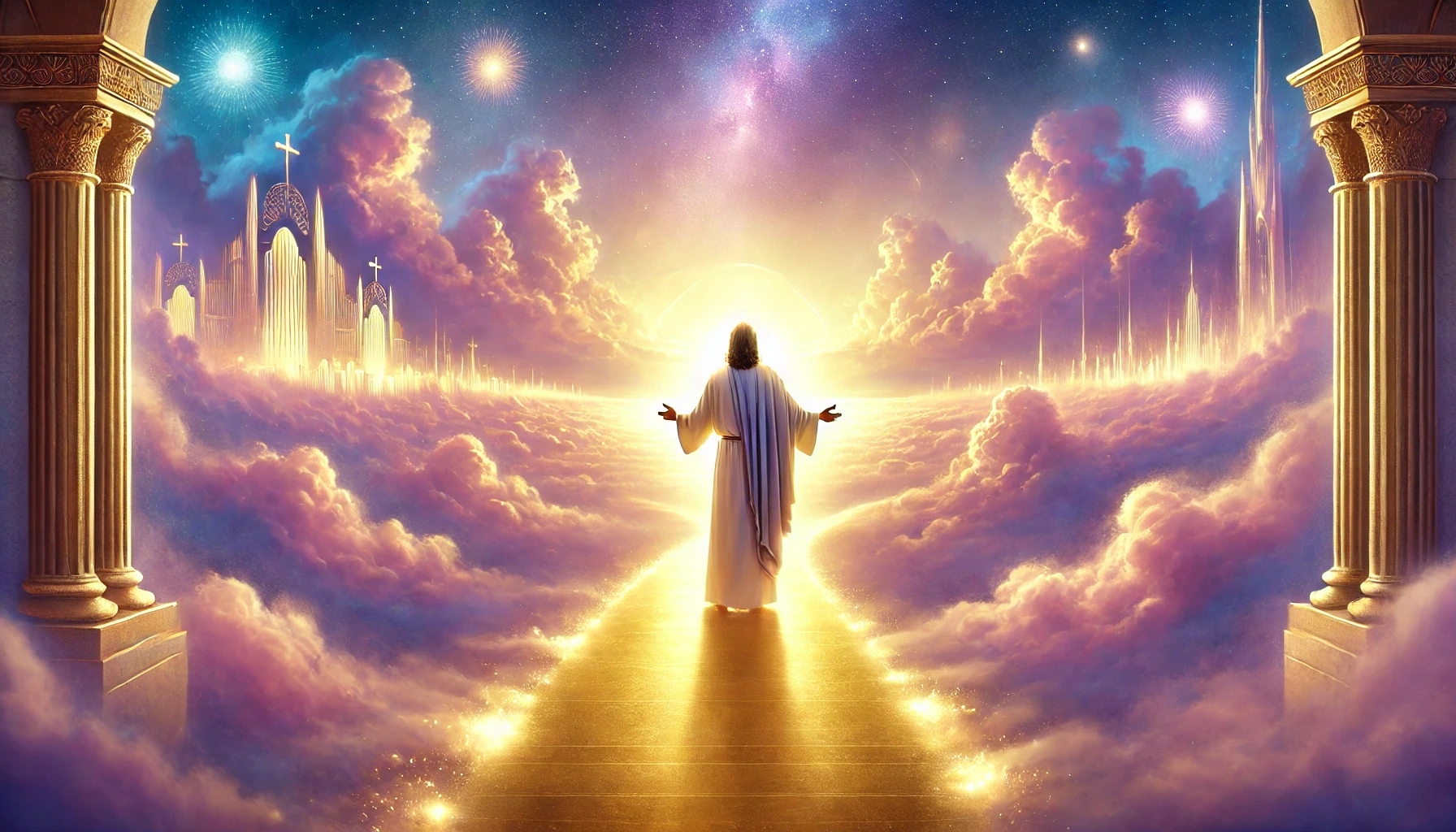


10.2 I Will Certainly Come Again
The Second Coming of Christ: Assurance from the Faithfulness of the Redeemer
Read John 14:1–3. In what context does Jesus say these words?
Jesus’ words in John 14:1–3 are a powerful promise that strengthens the faith and hope of the disciples—and continues to offer comfort and assurance today. In the context of His impending crucifixion and farewell to the disciples, Jesus speaks not only of His departure but also of His return. His words reveal three important aspects:
-
Comfort in Times of Uncertainty
Jesus recognizes the confusion and fear of His disciples, triggered by the announcement of His departure. His assurance that their hearts should not be troubled shows His care and desire to calm them. This “troubled” (Greek: tarassō) describes a deep inner upheaval, which Jesus overcomes through His words of comfort. Even in our own times of uncertainty, this promise reminds us that we can trust in Him.
-
The Place of Hope: The Father’s House
Jesus speaks of the “house of His Father,” a picture of eternity with God. The “many rooms” illustrate that there is room for all who believe in Him in God’s kingdom. This image conveys security, community, and the assurance that everyone will have their fixed place in God’s presence. It shows us that eternity is not an abstract idea but a reality that Jesus has prepared for us.
-
The Absolute Certainty of His Return
Jesus does not just say that He will return; He expresses this promise in the Greek future perfect tense, conveying unwavering certainty. His words “I am coming” emphasize that His return is as sure as if it were already happening. The foundation of this trust is not only the fulfillment of prophetic predictions but also the very nature of Jesus Himself: His character, love, and faithfulness make this promise absolutely reliable.
The Significance for Our Faith Today
-
Hope in Difficult Times: Jesus’ words direct our gaze beyond life’s storms to eternity. They remind us that even amid suffering and uncertainty, a reliable hope awaits us.
-
A Home with God: The “Father’s house” symbolizes the ultimate redemption and the goal of our journey as Christians. It invites us to view our lives from the perspective of eternity.
-
Trust in His Promises: Confidence in Jesus’ return is based on His faithfulness. This promise is not a vague hope but a firm assurance grounded in the very character of God.
Conclusion
The words “I will surely come again” are an invitation to trust Jesus—even in times of doubt and uncertainty. His return is not only a prophetic reality but also an expression of His love and desire to have us with Him forever. In this promise lies comfort, hope, and the assurance that our faith has a secure anchor: Jesus Christ Himself.
What Does the Cross Teach Us About the Certainty of Christ’s Return? What Would Jesus’ Death Have Been Useful Without His Return?
The cross is the central symbol of the Christian faith, revealing not only the depth of God’s love but also the certainty of Christ’s return. Here are the essential teachings that connect the cross with the Second Coming:
-
The Fulfillment of God’s Redemptive Plan
At the cross, Jesus cried out, “It is finished” (John 19:30). These words indicate that the work of redemption was completed through His death. However, the story of redemption does not end at the cross—it is fulfilled with His return. The cross was the first step in restoring the relationship between God and humanity. The Second Coming will complete this process by fully bringing us back into God’s presence.
-
The Cross as a Guarantee of the Return
Through His death on the cross, Jesus demonstrated His willingness to give everything to save humanity. This dedication is the foundation for trusting His promise of return. If He was willing to make the ultimate sacrifice, we can be certain that He will also come back to gather the fruits of that sacrifice—us—to Himself (John 14:3).
-
Victory Over Sin and Death
The cross marks Jesus’ victory over sin, and His resurrection seals the triumph over death. His return will make this victory visible by completely eliminating the power of sin and death (1 Corinthians 15:54-57). Without the Second Coming, the world would remain plagued by sin and suffering, and the victory of the cross would not be fully manifested.
What Would Jesus’ Death Be Useful Without the Second Coming?
Without the Second Coming of Christ, Jesus’ death, while a profound expression of love and sacrifice, would remain incomplete in its purpose:
-
Incomplete Redemption: Jesus’ death brought the forgiveness of sins, but without His return, there would be no final liberation from sin, suffering, and death. Humanity would remain trapped in a world full of pain, without the hope of complete restoration.
-
No Hope for Eternity: Jesus promised to prepare a place for us in the Father’s house (John 14:2-3). Without the Second Coming, there would be no ultimate fulfillment of this promise, and the goal of our faith—eternal life with God—would remain unattainable.
-
Loss of Hope and Purpose: The promise of Jesus’ return gives believers hope, comfort, and direction. Without this perspective, the cross would lose its transformative power, and our faith would be, as Paul says, “futile” (1 Corinthians 15:19).
Conclusion
The cross and the Second Coming of Christ are inseparably linked. The cross shows us how far Jesus would go to save us, and His return ensures that this salvation is complete and final. Without the Second Coming, Jesus’ death would be an act of love without ultimate purpose or eternal hope. The Second Coming gives the cross its universal and eternal significance: the fulfillment of God’s plan to bring His people to Himself.
The promise of Jesus’ return not only holds profound theological meaning but also shapes how we live our faith and daily lives. Here are the most important connections:
-
Hope in Difficult Times
In daily life, we encounter uncertainties, suffering, and challenges that test our faith. Jesus’ words in John 14:1–3 remind us that this world is not the end. His promise to bring us to Himself gives us strength and hope to remain steadfast even in the toughest moments. This perspective allows us to live with confidence and trust in what God has prepared for us.
-
An Eternal Perspective
The promise of a place in the Father’s house invites us to focus not only on the here and now but to see our lives in the light of eternity. This influences our decisions:
-
Valuing What Lasts: We prioritize what has lasting significance, such as love, justice, and faith.
-
Living with Purpose: It motivates us to live our lives with a goal that transcends the world.
-
A Life of Trust
The certainty of Jesus’ return calls us to rest in His faithfulness. Even when circumstances sometimes discourage us, we can trust in Jesus’ promise to come and make all things new. This trust gives us peace, even when we do not fully understand God’s plan.
-
Encouragement to a Life of Discipleship
The Second Coming is not only a hope but also an encouragement:
-
Holiness and Vigilance: Jesus’ return reminds us of the importance of growing in our faith and living in a way that honors God.
-
Serving in Love: Knowing that Jesus is coming back, we are invited to make His love visible in our relationships and service.
-
Forgiveness and Patience
Jesus’ promise inspires us to be patient and to forgive others. The hope of His return helps us let go of conflicts because we know that God will ultimately make everything right. It gives us the strength to live in peace with others and to strive for justice.
Conclusion: Faith in Daily Life
The promise “I will surely come again” is an anchor for our lives. It teaches us to:
-
Walk Through Difficulties with Hope.
-
Align Our Priorities with Eternity.
-
Live in Trust, Holiness, and Love.
Jesus’ return is not only a future event but a reality that shapes our everyday lives today. It provides us with a perspective of comfort, responsibility, and hope that defines our lives as Christians.
The certainty of Jesus’ return gives us hope, strength, and a perspective that goes beyond today.
(Visited 11 times, 1 visits today)






















